

|
| Apache Geronimo > Index > Development > XML Schemas > Apache Geronimo v2.2 XML Schemas | User List | Dev List | Wiki | Issue Tracker |
|
Documentation for geronimo-connector-1.2Table of Contents
Schema Document Properties
Declared Namespaces
Schema Component Representation
<xs:schema
targetNamespace="http://geronimo.apache.org/xml/ns/j2ee/connector-1.2" elementFormDefault="qualified" attributeFormDefault="unqualified">
<xs:import
namespace="http://geronimo.apache.org/xml/ns/naming-1.2" schemaLocation="geronimo-naming-1.2.xsd"/>
<xs:import
namespace="http://geronimo.apache.org/xml/ns/deployment-1.2" schemaLocation="geronimo-module-1.2.xsd"/>
<xs:import
namespace="http://www.w3.org/XML/1998/namespace" schemaLocation="http://www.w3.org/2001/xml.xsd"/>
... </xs:schema>Global DeclarationsElement: connector
Logical Diagram
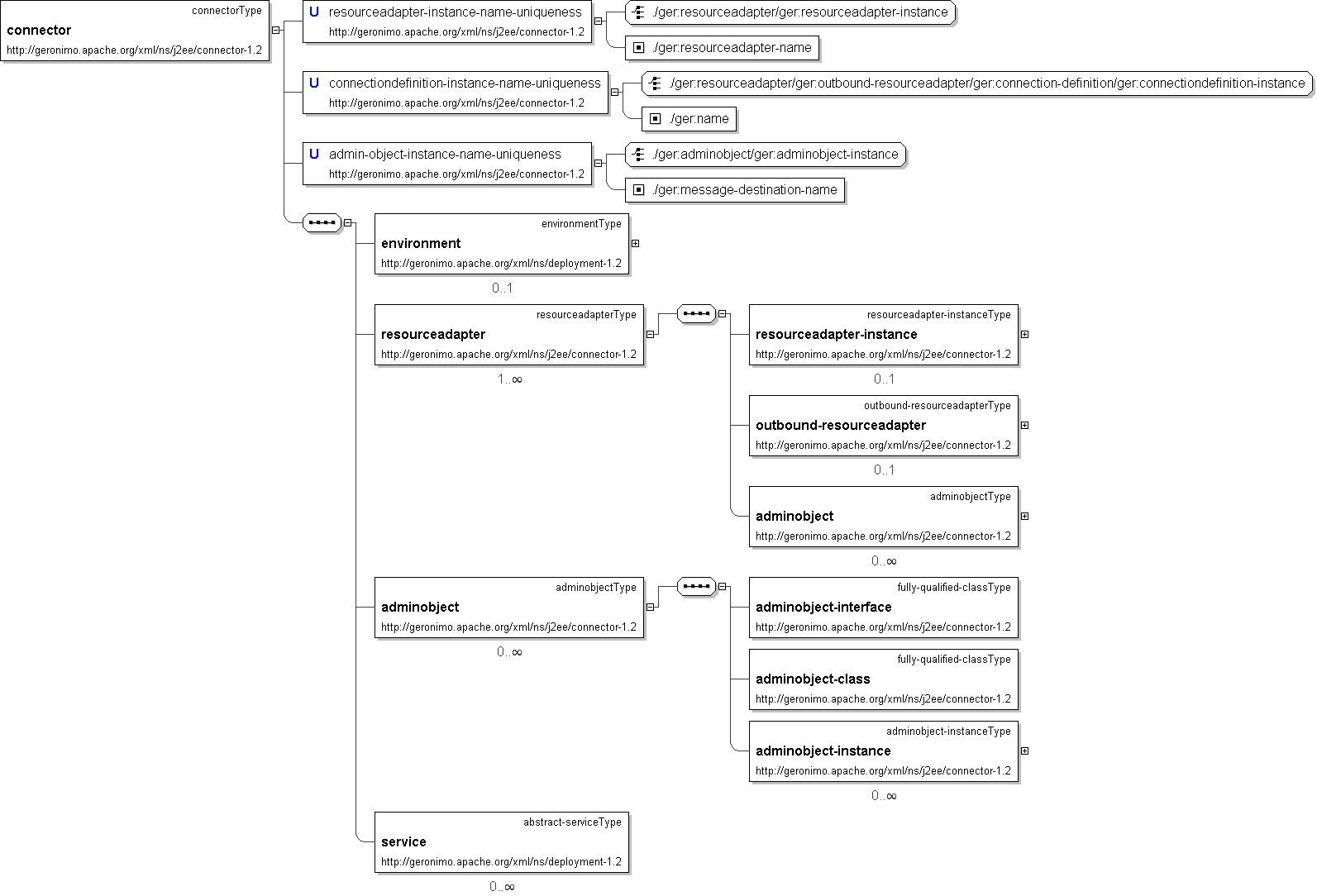
XML Instance Representation
<ger:connector>
<!--
Uniqueness Constraint - resourceadapter-instance-name-uniqueness Selector - ger:resourceadapter/ger:resourceadapter-instance Field(s) - ger:resourceadapter-name --> <!--
Uniqueness Constraint - connectiondefinition-instance-name-uniqueness Selector - ger:resourceadapter/ger:outbound-resourceadapter/ger:connection-definition/ger:connectiondefinition-instance Field(s) - ger:name --> <!--
Uniqueness Constraint - admin-object-instance-name-uniqueness Selector - ger:adminobject/ger:adminobject-instance Field(s) - ger:message-destination-name --> <sys:environment> ... </sys:environment> [0..1]
'Reference to environment element defined in imported \"geronimo-module-1.2.xsd\"' <ger:resourceadapter>
ger:resourceadapterType
</ger:resourceadapter> [1..*]
'The element resourceadapter defines the resource adapters for the connector defined in the document.' <ger:adminobject>
ger:adminobjectType
</ger:adminobject> [0..*]
'The element adminobject maps back to adminobject defined in ra.xml. It provides specific instance information for administer object defined in ra.xml. For example, if topic is declared in the ra.xml this could provide topic instance information. An admin object configured here cannot implement ResourceAdapterAssociation.' <sys:service> ... </sys:service> [0..*]
</ger:connector>'Reference to service element defined in imported \"geronimo-module-1.2.xsd\".'
Diagram
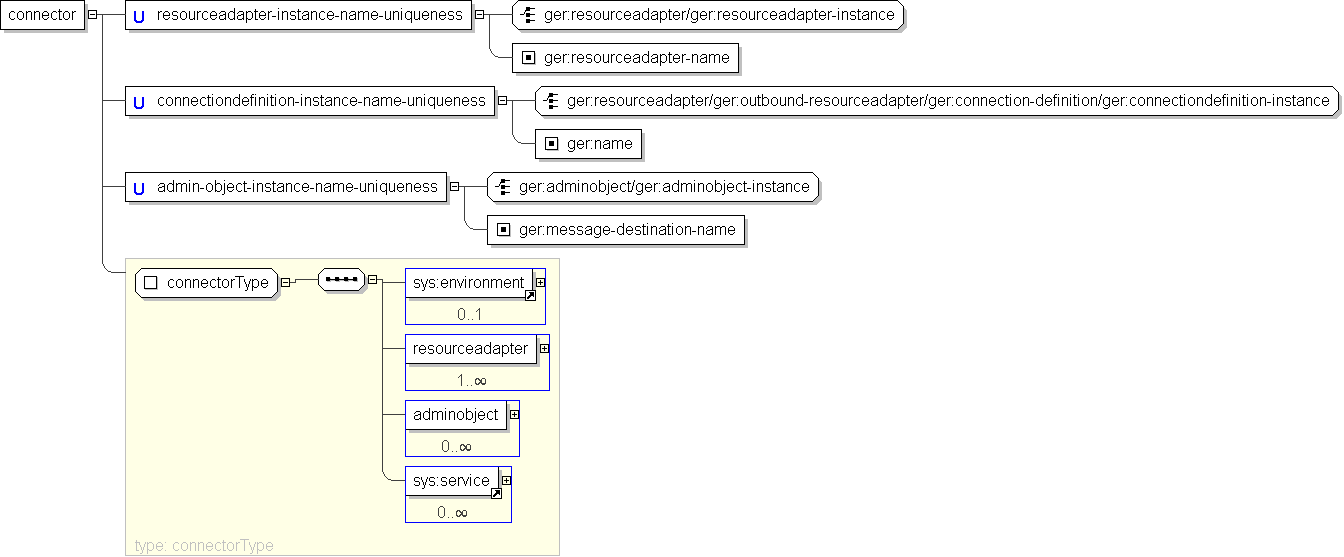
Schema Component Representation
<xs:element
name="connector" type="
ger:connectorType
">
<xs:unique
name="resourceadapter-instance-name-uniqueness">
<xs:selector
xpath="ger:resourceadapter/ger:resourceadapter-instance"/>
<xs:field
xpath="ger:resourceadapter-name"/> </xs:unique><xs:unique
name="connectiondefinition-instance-name-uniqueness">
<xs:selector
xpath="ger:resourceadapter/ger:outbound-resourceadapter/ger:connection-definition/ger:connectiondefinition-instance"/>
<xs:field
xpath="ger:name"/> </xs:unique><xs:unique
name="admin-object-instance-name-uniqueness"> </xs:element><xs:selector
xpath="ger:adminobject/ger:adminobject-instance"/>
<xs:field
xpath="ger:message-destination-name"/> </xs:unique>Global DefinitionsComplex Type: adminobject-instanceType
XML Instance Representation
<...>
<ger:message-destination-name>
xs:string </ger:message-destination-name> [1]
'A unique name for admin object instance. Used in object name of gbean for it. Matches message-destination-name in ejb-jar.xml assembly descriptor.' <ger:config-property-setting>
ger:config-property-settingType
</ger:config-property-setting> [0..*]
</...>'The element config-property-setting specifies the set of properties for admin object instance.'
Diagram

Schema Component Representation
<xs:complexType
name="adminobject-instanceType">
<xs:sequence>
</xs:complexType><xs:element
name="config-property-setting" type="
ger:config-property-settingType
" minOccurs="0" maxOccurs="unbounded"/> </xs:sequence>Complex Type: adminobjectType
XML Instance Representation
<...>
<ger:adminobject-interface>
ger:fully-qualified-classType
</ger:adminobject-interface> [1]
'The element adminobject-interface maps back to an adminobject-interface element in ra.xml. It specifies the fully qualified name of Java interface of the administrated object.' <ger:adminobject-class>
ger:fully-qualified-classType
</ger:adminobject-class> [1]
'The element adminobject-class maps back to an adminobject-class element in ra.xml. It specifies the fully qualified name of Java class of the administrated object.' <ger:adminobject-instance>
ger:adminobject-instanceType
</ger:adminobject-instance> [0..*]
</...>'The element adminobject-instance contains the configuration for this specific instance of the administered object type, with a unique name, and values for any configuration properties necessary for that administered object type.'
Diagram

Schema Component Representation
<xs:complexType
name="adminobjectType">
<xs:sequence>
</xs:complexType><xs:element
name="adminobject-instance" type="
ger:adminobject-instanceType
" minOccurs="0" maxOccurs="unbounded"/> </xs:sequence>Complex Type: config-property-settingType
XML Instance Representation
Diagram

Schema Component Representation
Complex Type: connection-definitionType
XML Instance Representation
<...>
<ger:connectionfactory-interface>
ger:fully-qualified-classType
</ger:connectionfactory-interface> [1]
'The connectionfactory-interface is unique in ra.xml so is used to index into ra.xml. It provides the fully qualified name of java interface used as connectionfactory for resource adapter.' <ger:connectiondefinition-instance>
ger:connectiondefinition-instanceType
</ger:connectiondefinition-instance> [0..*]
</...>'The connectiondefinition-instance provides the configuration for a specific connection.'
Diagram

Schema Component Representation
<xs:complexType
name="connection-definitionType">
<xs:sequence>
</xs:complexType><xs:element
name="connectiondefinition-instance" type="
ger:connectiondefinition-instanceType
" minOccurs="0" maxOccurs="unbounded"/> </xs:sequence>Complex Type: connectiondefinition-instanceType
XML Instance Representation
<...>
<ger:name>
xs:string </ger:name> [1]
'The unique name of the connection definition instance used to identify the connection configuration specified here.' <ger:implemented-interface>
ger:fully-qualified-classType
</ger:implemented-interface> [0..*]
'Additional fully qualified name of java interfaces implemented by the connectionfactory used by the application apart from the connectionfactory-interface specified before.' <ger:config-property-setting>
ger:config-property-settingType
</ger:config-property-setting> [0..*]
'The element config-property-setting specifies the set of properties for connection instance.' <ger:connectionmanager>
ger:connectionmanagerType
</ger:connectionmanager> [1]
</...>'The connectionmanager element specifies the connection specific settings like transaction, security, and connection pool.'
Diagram
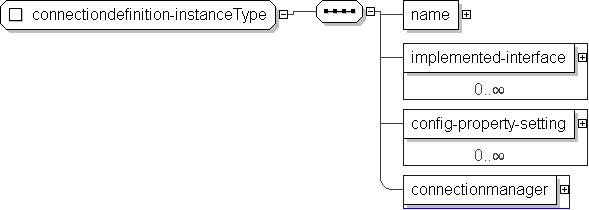
Schema Component Representation
<xs:complexType
name="connectiondefinition-instanceType">
<xs:sequence>
</xs:complexType><xs:element
name="implemented-interface" type="
ger:fully-qualified-classType
" minOccurs="0" maxOccurs="unbounded"/>
<xs:element
name="config-property-setting" type="
ger:config-property-settingType
" minOccurs="0" maxOccurs="unbounded"/>
<--<xs:choice>-->
<--<xs:element name="connectionmanager-ref" type="xs:string"/>-->
<--</xs:choice>--> </xs:sequence>Complex Type: connectionmanagerType
XML Instance Representation
<...>
<ger:container-managed-security>
ger:emptyType
</ger:container-managed-security> [0..1]
Start Choice
[0..1]
'This empty element indicates that the connection is authenticated by container and no user authentication is required. This setting is ignored if res-auth is provided inr resource-ref.' <ger:no-transaction>
ger:emptyType
</ger:no-transaction> [1]
'This empty element indicates no participation of connection in any transactions.' <ger:local-transaction>
ger:emptyType
</ger:local-transaction> [1]
'This empty element indicates participation of connection in only local transactions involving only this connection.' <ger:xa-transaction>
ger:xatransactionType
</ger:xa-transaction> [1]
'The xa-transaction element indicates participation of connection in multi resource transactions. This element provides caching information for XA transaction.' <ger:transaction-log>
ger:emptyType
</ger:transaction-log> [1]
End Choice
'This empty element indicates participation JDBC resource of local transaction type in XA transactions.' Start Choice [1] <ger:no-pool>
ger:emptyType
</ger:no-pool> [1]
'This empty element indicates connection will not be pooled at all, which mean every connection request will open a connection for its own purpose.' <ger:single-pool>
ger:singlepoolType
</ger:single-pool> [1]
'This element indicates connection will pooled in only one connection pool. This element provides information about single connection pool being deployed.' <ger:partitioned-pool>
ger:partitionedpoolType
</ger:partitioned-pool> [1]
End Choice
'This element indicates connection will pooled in multiple connection pools. This element provides information about multiple connection pools being deployed.' </...>
Diagram

Schema Component Representation
<xs:complexType
name="connectionmanagerType">
<xs:sequence>
</xs:complexType><xs:choice
minOccurs="0">
</xs:choice>
<xs:choice>
</xs:choice> </xs:sequence>Complex Type: connectorType
XML Instance Representation
<...>
<sys:environment> ... </sys:environment> [0..1]
'Reference to environment element defined in imported \"geronimo-module-1.2.xsd\"' <ger:resourceadapter>
ger:resourceadapterType
</ger:resourceadapter> [1..*]
'The element resourceadapter defines the resource adapters for the connector defined in the document.' <ger:adminobject>
ger:adminobjectType
</ger:adminobject> [0..*]
</...>'The element adminobject maps back to adminobject defined in ra.xml. It provides specific instance information for administer object defined in ra.xml. For example, if topic is declared in the ra.xml this could provide topic instance information. An admin object configured here cannot implement ResourceAdapterAssociation.'
Diagram
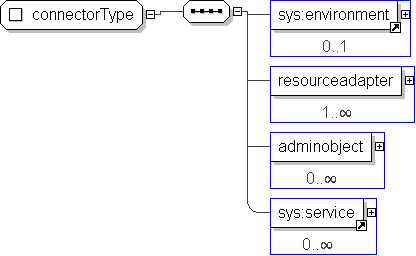
Schema Component Representation
<xs:complexType
name="connectorType">
<xs:sequence>
</xs:sequence> </xs:complexType>Complex Type: descriptionType
Diagram

Schema Component Representation
Complex Type: emptyType
XML Instance Representation
<.../>
Diagram

Schema Component Representation
<xs:complexType
name="emptyType"/>
Complex Type: outbound-resourceadapterType
XML Instance Representation
<...>
<ger:connection-definition>
ger:connection-definitionType
</ger:connection-definition> [1..*]
</...>'The connection-definitionType defines a set of connection interfaces and classes pertaining to a particular connection type. This also includes configurable properties for ManagedConnectionFactory instances that may be produced out of this set. The name element uniquely identifies this instance.'
Diagram

Schema Component Representation
<xs:complexType
name="outbound-resourceadapterType">
<xs:sequence> </xs:complexType><xs:element
name="connection-definition" type="
ger:connection-definitionType
" maxOccurs="unbounded"/> </xs:sequence>Complex Type: partitionedpoolType
XML Instance Representation
<...>
<ger:max-size>
xs:int </ger:max-size> [0..1]
'The maximum number of connection in a connection pool being deployed. The connection pool will stop filling once reached this value.' <ger:min-size>
xs:int </ger:min-size> [0..1]
'The minimum number of connection in a connection pool being deployed. The connection pool will try to fill itself if the number of connections fall below this value.' <ger:blocking-timeout-milliseconds>
xs:int </ger:blocking-timeout-milliseconds> [0..1]
'The time after which timeout will be thrown if no connections are available to be loaned in a connection pool.' <ger:idle-timeout-minutes>
xs:int </ger:idle-timeout-minutes> [0..1]
Start Choice
[1]
'The time after which connection will be automatically considered released.' <ger:match-one>
ger:emptyType
</ger:match-one> [1]
'This element indicates that only one connection needs to be checked for matching the connection request. If the connection does not match, it throws an error to the effect of \"please adjust your configuration and try again\".' <ger:match-all>
ger:emptyType
</ger:match-all> [1]
'This element indicates that all the connections need to be checked for matching the connection request.' <ger:select-one-assume-match>
ger:emptyType
</ger:select-one-assume-match> [1]
End Choice
'This empty field indicated that no connection settings need to checked and matched, and assumes that all connections are same and one of them will be returned back to client.' </...>
Diagram

Schema Component Representation
<xs:complexType
name="partitionedpoolType">
<xs:complexContent></xs:complexContent> </xs:complexType>Complex Type: resourceadapter-instanceType
XML Instance Representation
<...>
<ger:resourceadapter-name>
xs:string </ger:resourceadapter-name> [1]
'The element resourceadapter-name provides a name for this resource adapter, and it is used to index back to the resourceadapter-name specified in ra.xml.' <ger:config-property-setting>
ger:config-property-settingType
</ger:config-property-setting> [0..*]
'The element config-property-setting specifies the set of properties for resource adapter instance.' <naming:workmanager> ... </naming:workmanager> [1]
</...>'Reference to workmanager element defined in imported \"geronimo-naming-1.2.xsd\"'
Diagram

Schema Component Representation
<xs:complexType
name="resourceadapter-instanceType">
<xs:sequence>
</xs:complexType><xs:element
name="config-property-setting" type="
ger:config-property-settingType
" minOccurs="0" maxOccurs="unbounded"/>
</xs:sequence>Complex Type: resourceadapterType
XML Instance Representation
<...>
<ger:resourceadapter-instance>
ger:resourceadapter-instanceType
</ger:resourceadapter-instance> [0..1]
'The resourceadapter instance provide resource adapter instance specific information like configuration properties and workmanager implementation.' <ger:outbound-resourceadapter>
ger:outbound-resourceadapterType
</ger:outbound-resourceadapter> [0..1]
'The outbound-resourceadapterType specifies information about an outbound resource adapter. The information includes fully qualified names of classes/interfaces required as part of the connector architecture specified contracts for connection management, level of transaction support provided, one or more authentication mechanisms supported and additional required security permissions. If there is no authentication-mechanism specified as part of resource adapter element then the resource adapter does not support any standard security authentication mechanisms as part of security contract. The application server ignores the security part of the system contracts in this case.' <ger:adminobject>
ger:adminobjectType
</ger:adminobject> [0..*]
</...>'The element adminobject maps back to adminobject defined in ra.xml. It provides specific instance information for administer object defined in ra.xml. For example, if topic is declared in the ra.xml this could provide topic instance information. An admin object configured here can implement ResourceAdapterAssociation.'
Diagram

Schema Component Representation
<xs:complexType
name="resourceadapterType">
<xs:sequence> </xs:complexType><xs:element
name="resourceadapter-instance" type="
ger:resourceadapter-instanceType
" minOccurs="0"/>
<xs:element
name="outbound-resourceadapter" type="
ger:outbound-resourceadapterType
" minOccurs="0"/>
</xs:sequence>Complex Type: singlepoolType
XML Instance Representation
<...>
<ger:max-size>
xs:int </ger:max-size> [0..1]
'The maximum number of connection in a connection pool being deployed. The connection pool will stop filling once reached this value.' <ger:min-size>
xs:int </ger:min-size> [0..1]
'The minimum number of connection in a connection pool being deployed. The connection pool will try to fill itself if the number of connections fall below this value.' <ger:blocking-timeout-milliseconds>
xs:int </ger:blocking-timeout-milliseconds> [0..1]
'The time after which timeout will be thrown if no connections are available to be loaned in a connection pool.' <ger:idle-timeout-minutes>
xs:int </ger:idle-timeout-minutes> [0..1]
Start Choice
[1]
'The time after which connection will be automatically considered released.' <ger:match-one>
ger:emptyType
</ger:match-one> [1]
'This element indicates that only one connection needs to be checked for matching the connection request. If the connection does not match, it throws an error to the effect of \"please adjust your configuration and try again\".' <ger:match-all>
ger:emptyType
</ger:match-all> [1]
'This element indicates that all the connections need to be checked for matching the connection request.' <ger:select-one-assume-match>
ger:emptyType
</ger:select-one-assume-match> [1]
End Choice
'This empty field indicated that no connection settings need to checked and matched, and assumes that all connections are same and one of them will be returned back to client.' </...>
Diagram
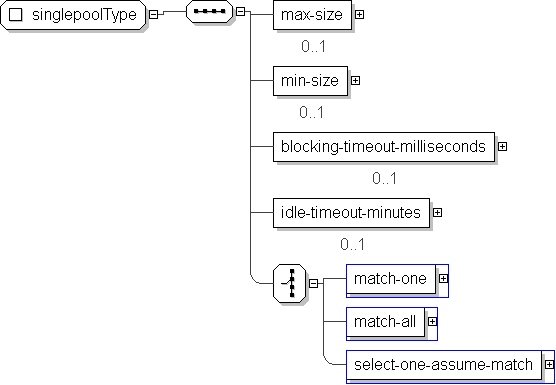
Schema Component Representation
<xs:complexType
name="singlepoolType">
<xs:sequence>
</xs:complexType><xs:choice>
</xs:choice> </xs:sequence>Complex Type: xatransactionType
XML Instance Representation
Diagram

Schema Component Representation
Simple Type: fully-qualified-classType
Diagram

Schema Component Representation
<xs:simpleType
name="fully-qualified-classType"></xs:simpleType>
LegendComplex Type:Schema Component Type
AusAddressSchema Component Name
If this schema component is a type definition, its type hierarchy is shown in a gray-bordered box.
The table above displays the properties of this schema component.
XML Instance Representation
<...
country="Australia"
>
<unitNo> string </unitNo> [0..1] <houseNo> string </houseNo> [1] <street> string </street> [1] Start Choice [1] <city> string </city> [1] <town> string </town> [1] End Choice <state> AusStates </state> [1] <postcode> string <<pattern = [1-9][0-9]{3}>> </postcode> [1] </...> The XML Instance Representation table above shows the schema component's content as an XML instance.
Schema Component Representation
<complexType
name="AusAddress">
<complexContent> <extension base=" Address "> <sequence> <element name="state" type=" AusStates "/> <element name="postcode"> <simpleType> <restriction base=" string "> <pattern value="[1-9][0-9]{3}"/> </restriction> </simpleType> </element> </sequence> <attribute name="country" type=" string " fixed="Australia"/> </extension> </complexContent> </complexType> The Schema Component Representation table above displays the underlying XML representation of the schema component. (Annotations are not shown.)
GlossaryAbstract (Applies to complex type definitions and element declarations). An abstract element or complex type cannot used to validate an element instance. If there is a reference to an abstract element, only element declarations that can substitute the abstract element can be used to validate the instance. For references to abstract type definitions, only derived types can be used. All Model Group Child elements can be provided in any order in instances. See: http://www.w3.org/TR/xmlschema-1/#element-all. Choice Model Group Only one from the list of child elements and model groups can be provided in instances. See: http://www.w3.org/TR/xmlschema-1/#element-choice. Collapse Whitespace Policy Replace tab, line feed, and carriage return characters with space character (Unicode character 32). Then, collapse contiguous sequences of space characters into single space character, and remove leading and trailing space characters.
Disallowed Substitutions
(Applies to element declarations). If substitution is specified, then substitution group members cannot be used in place of the given element declaration to validate element instances. If derivation methods, e.g. extension, restriction, are specified, then the given element declaration will not validate element instances that have types derived from the element declaration's type using the specified derivation methods. Normally, element instances can override their declaration's type by specifying an Key Constraint Like Uniqueness Constraint, but additionally requires that the specified value(s) must be provided. See: http://www.w3.org/TR/xmlschema-1/#cIdentity-constraint_Definitions. Key Reference Constraint Ensures that the specified value(s) must match value(s) from a Key Constraint or Uniqueness Constraint. See: http://www.w3.org/TR/xmlschema-1/#cIdentity-constraint_Definitions. Model Group Groups together element content, specifying the order in which the element content can occur and the number of times the group of element content may be repeated. See: http://www.w3.org/TR/xmlschema-1/#Model_Groups.
Nillable
(Applies to element declarations). If an element declaration is nillable, instances can use the Notation A notation is used to identify the format of a piece of data. Values of elements and attributes that are of type, NOTATION, must come from the names of declared notations. See: http://www.w3.org/TR/xmlschema-1/#cNotation_Declarations. Preserve Whitespace Policy Preserve whitespaces exactly as they appear in instances. Prohibited Derivations (Applies to type definitions). Derivation methods that cannot be used to create sub-types from a given type definition. Prohibited Substitutions (Applies to complex type definitions). Prevents sub-types that have been derived using the specified derivation methods from validating element instances in place of the given type definition. Replace Whitespace Policy Replace tab, line feed, and carriage return characters with space character (Unicode character 32). Sequence Model Group Child elements and model groups must be provided in the specified order in instances. See: http://www.w3.org/TR/xmlschema-1/#element-sequence. Substitution Group Elements that are members of a substitution group can be used wherever the head element of the substitution group is referenced. Substitution Group Exclusions (Applies to element declarations). Prohibits element declarations from nominating themselves as being able to substitute a given element declaration, if they have types that are derived from the original element's type using the specified derivation methods. Target Namespace The target namespace identifies the namespace that components in this schema belongs to. If no target namespace is provided, then the schema components do not belong to any namespace. Uniqueness Constraint Ensures uniqueness of an element/attribute value, or a combination of values, within a specified scope. See: http://www.w3.org/TR/xmlschema-1/#cIdentity-constraint_Definitions. |